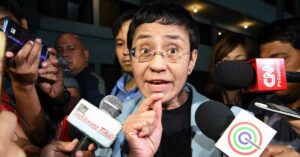LAST January 28, President Ferdinand Marcos Jr. led the kick-off rally launching the “Bagong Pilipinas” (New Philippines) branding of his administration, calling for unity to build a progressive nation, strong economy and secure future for Filipinos.
Bagong Pilipinas is the all-embracing and central leitmotif of the Marcos administration’s brand of governance and leadership, which accordingly is characterized by a principled, accountable and dependable government reinforced by unified institutions of society. The rally was attended by Cabinet members, lawmakers, local government officials and the public.
Irony
Looking back, during a media interview on Jan. 29, 2024, with the SMNI “Nightline News,” I encountered a thought-provoking query about my reaction to President Marcos’ speech at the unveiling of Bagong Pilipinas as the defining theme for his administration. I couldn’t help but find the slogan of the current government laden with irony.
The irony in the Bagong Pilipinas branding stems from perceived contradictions between the promised reforms and the actual conditions experienced by many Filipinos, between the administration’s messaging of a Bagong Pilipinas to project an image of a fresh start of a new era of good governance and the realities on the ground, between evoking the legacy drawing parallels with the Bagong Lipunan (New Society) of Ferdinand Marcos Sr. and the Marcos family’s historical legacy and baggage of authoritarian rule, and issues of corruption, overindulgence, suppression of dissent, human rights abuses and economic downturns.
These dualities have led to contention over the authenticity and intentions behind the Marcos administration’s branding efforts, with some viewing this branding effort as an attempt to reshape and reframe the historical narrative surrounding the Marcos family’s past and creating a dissonance between the promise of renewal, and the family’s historical legacy while lacking significant and substantial transformation.
Note that in the midst of their daily struggles and demanding circumstances, countless Filipinos continue to confront a relentless status quo, with their everyday lives persisting unchanged and with little meaningful change on the horizon. Thus, for some critics, the Marcos family’s return to the country’s highest political office might not signify a new beginning or a New Philippines but rather a controversial and contentious comeback. It seems that the Marcos family’s return to power is in itself an irony.
Economic challenges
Indeed, it seems apparent that despite promises of progress and transformation as ideals being embodied by Bagong Pilipinas, there’s an apparent gap between the branding ideals, which are perceived to be superficial, and the realities on the ground in the face of pressing contemporary socioeconomic and political challenges such as rising inflation, economic disparities and poverty, underemployment, unemployment, widespread and massive corruption, and the need for genuine governance reforms.
The Bagong Pilipinas branding champions economic growth and prosperity for all. However, the economic policies/strategies of the incumbent administration have yet to significantly address the deep-seated inequalities and poverty affecting large segments of the country’s population. The Philippines continues to face challenges such as job insecurity, rising inflation, especially in basic commodities and services, and inadequate access to basic services, which is a glaring contrast to the projected image of widespread prosperity.
The Philippines faces several pressing economic issues as it enters 2024 despite expectations of continued growth. The economic forecasts for the Philippine economy by multilateral agencies show that it will grow by around 6.2 percent in 2024. However, several challenges could dampen this projection, including risks from a potential slowdown in major economies, geopolitical tensions, political instability and persistent inflation pressures.
The country’s economic growth has no doubt been affected by inflation, tepid consumer spending and limited fiscal space due to elevated government debt levels. The country faces sluggish growth in household spending as an impact of high inflation on consumer purchasing power. Another critical issue is the country’s infrastructure gap, which limits competitiveness and productivity. This gap spans transportation, energy, water and digital connectivity, hindering daily life and economic activities. Significant bottlenecks also include traffic congestion, power outages, the rising cost of electricity, transportation and communication, water scarcity and limited digital infrastructure (i.e., limited internet access).
Furthermore, the Marcos administration is also facing challenges in managing the country’s energy needs amid global market pressures and volatility. Efforts to secure energy supplies crucial for the country’s economic development, growth and security are apparent concerns. There’s a pressing challenge of an impending energy crisis, with the Malampaya gas fields expected to be depleted anytime soon (2024-2025). Despite considerable potential for renewable energy, a significant portion of the population is without reliable electricity access.
Hence, if the Bagong Pilipinas mantra is to gain political currency, the effectiveness of the current administration’s economic and fiscal strategies/policies in addressing these socioeconomic issues is critical. Addressing these challenges requires a multipronged approach, including boosting local food production and agricultural productivity, raising household incomes, enhancing social protection and investing in high-impact infrastructure projects, including digital infrastructure, that will support inclusive growth, increase rural incomes and ensure food security amid rising global commodity prices and local supply constraints.
Governance and corruption
The Philippines is also currently grappling with a range of pressing political and governance-related issues/risks that impact its socioeconomic landscape and prospects for economic stability and growth.
The Marcos administration faces the perennial challenge of corruption. Efforts to promote transparency, accountability and good governance are said to be the embodiment of the Bagong Pilipinas narrative. Hence, if this branding is to be believable, substantial actions to combat corruption and nepotism are necessary and critical to match the branding with reality.
Furthermore, the issue of unprogrammed funds in the 2024 national budget is one of the significant political issues that the country is grappling with. Opposition lawmakers have challenged the constitutionality of these funds, which have significantly increased from the amount initially requested by the executive branch. Critics argue that this allows for boundless discretionary spending, of particular concern given the upcoming midterm elections in 2025.
The country is also facing a political crisis stemming from efforts by the current political establishment to amend the Constitution through the so-called fake people’s initiative.
All these issues reflect broader societal concerns over governance that the Marcos administration needs to effectively navigate to ensure stability and prosperity, and safeguard democratic values and processes, which, sadly, the current administration has not satisfactorily addressed yet.
Moreover, President Marcos’ prescriptions, urging government employees and officials to eschew idleness, dishonesty and corruption, to combat red tape, safeguard public funds, reject extravagance and indulgence, and raise their voices against corruption and malevolence, as eloquently articulated during his speech at the launch of the Bagong Pilipinas campaign, strike me as invaluable directives for fostering a culture of good governance.
Undoubtedly, these directives encapsulate the fundamental values and character traits that ought to be embraced and exemplified by individuals serving in the public sector.
Nonetheless, there’s an adage and wisdom, “Actions speak louder than words,” emphasizing that words alone, devoid of corresponding deeds, hold no true significance and impact. There’s also this proverb that says, “Practice what you preach,” which means actions must align with words, emphasizing the importance of authenticity, for genuine leadership involves embodying the principles one advocates.
In this regard, if the current administration of Marcos aspires to garner genuine and sincere commitment from Filipinos toward this Bagong Pilipinas narrative, the challenge is they must demonstrate these ideals of good governance with unwavering dedication and authenticity, and they must lead and serve as exemplary role models through their actions, ensuring that their conduct aligns seamlessly with the values they advocate.
Source: The Manila Times
https://www.manilatimes.net/2024/02/03/opinion/columns/marcos-jrs-bagong-pilipinas-narrative-isnt-it-ironic/1930822



